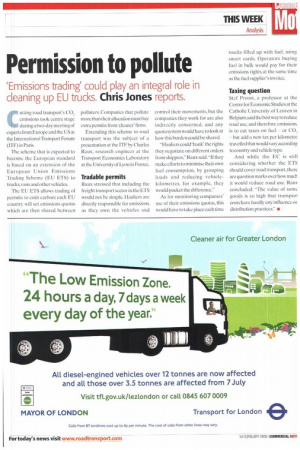Permission to pollute
Page 15

If you've noticed an error in this article please click here to report it so we can fix it.
'Emissions trading' could play an integral role in cleaning up EU trucks. Chris Jones reports.
utting road transport's CO2 emissions took centre stage during a two-day meeting of experts from Europe and the US at the international Transport Forum (ITF) in Paris.
The scheme that is expected to become the European standard is based on an extension of the European Union Emissions Trading Scheme (EU ETS) to trucks, vans and other vehicles.
The EU ETS allows trading of permits to emit carbon: each ELI country will set emissions quotas which are then shared between polluters. Companies that pollute more than their allocation must buy extra permits from 'cleaner' firms.
Extending this scheme to road transport was the subject of a presentation at the ITF by Charles Raux, research engineer at the Transport Economics Laboratory at the t Iniversity of Lyon in France.
Tradable permits
Raux stressed that including the freight transport sector in the ETS would not be simple. Hauliers are directly responsible for emissions, as they own the vehicles and control their movements, but the companies they work for are also indirectly concerned, and any quota system would have to look at how this burden could be shared.
"Haulicrscould`bank' the rights they negotiate on different orders from shippers," Raux said. "If they make efforts to minimise their own fuel consumption, by grouping loads and reducing vehiclekilometres, for example, they would pocket the difference."
As for monitoring companies' use of their emissions quotas, this would have to take place each time trucks filled up with fuel, using smart cards. Operators buying fuel in bulk would pay for their emissions rights at the same lime as the fuel supplier's invoice.
Taxing question
Stef Proost, a professor at the Centre for Economic Studies at the Catholic University of Leuven in Belgium,said the best way to reduce road use, and therefore emissions. is to cut taxes on fuel — or CO2 — but add a new tax per kilometre travelled that would vary according to country and vehicle type.
And while the EC is still considering whether the ETS should cover road transport, there are question marks over how much it would reduce road use. Rauoi concluded: "The value of some goods is so high that transpori costs have hardly any influence or distribution practices." •
































































































































































